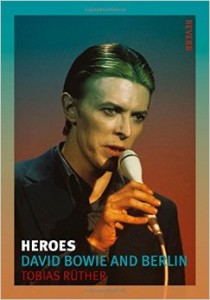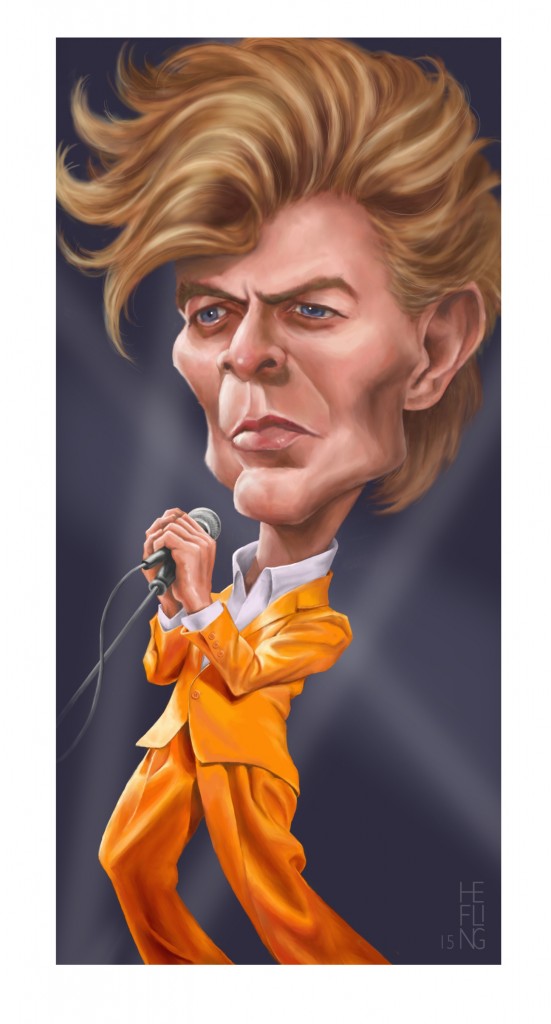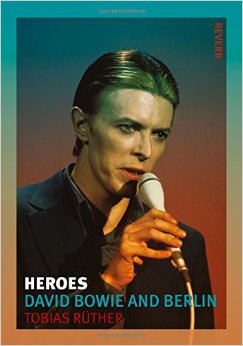 Heroes: David Bowie in Berlin
Heroes: David Bowie in Berlin
by Tobias Rüther
Reaktion Books. 184 pages, $25.
“Do you like girls or boys?” asked David Bowie in the song “Hallo Spaceboy” (1996), add-ing slyly, “It’s confusing these days.” Since the 70s, Bowie has worked hard to generate similar confusion about his own sexuality through personæ like glam-rocker Ziggy Stardust (with his “God-given ass”), the epicene Thin White Duke, and his collaboration, in the 80s, with Queen. In the 90s, Bowie updated his bisexual image once more, declaring on Buddha of Suburbia that the “whole world is queer.” As recently as 2013, Bowie had another comeback, this time with The Next Day, a stellar album in which he sings lovingly of running with the boys—“dirty boys,” that is. Could he be alluding to the urban legend that his first wife caught Mick Jagger and himself in flagrante delicto?
In Berlin for three years (1976–79), Bowie relocated to 155 Hauptstrasse (not far from Dietrich’s birthplace and Isherwood’s digs in the early 1930s) to beat his dependence on cocaine and to reinvent his sound with the help of Iggy Pop, Brian Eno, and Tony Visconti. The output of that storied period, known as the Berlin triptych, occupies a sacred place in Bowie’s body of work. Three albums, 1977’s Low and Heroes, followed by Lodger in 1979, remain essential listening not only because the songs range from the instrumentally gothic “Warsawza” to the crowd-pleasing “Heroes,” but also because they anticipate the ’80s, when Bowie would reinvent himself once more as the poperatic singer of “Modern Love” and “Let’s Dance.”[/groups_member]
If Bowie has been metamorphosing for decades now—so many ch-ch-changes since his origins in British psychedelia—Tobias Rüther’s Heroes: David Bowie in Berlin only confuses matters more. While it is clear the author wants to approach Bowie from a wider cultural angle—to his credit, Rüther has an encyclopedic  knowledge of high, low, and popular art—he fails to do justice to an extraordinary phase in a truly chameleonic career. In a book that is less about the music than about the author’s musings on Bowie’s wider importance (very little of which pertains to the Spaceman’s sexuality), Rüther rightfully calls the artist’s Berlin phase the “most daring music of his career.”
knowledge of high, low, and popular art—he fails to do justice to an extraordinary phase in a truly chameleonic career. In a book that is less about the music than about the author’s musings on Bowie’s wider importance (very little of which pertains to the Spaceman’s sexuality), Rüther rightfully calls the artist’s Berlin phase the “most daring music of his career.”
Lacking in continuity and focus, the book’s six chapters range from Bowie’s arrival in West Berlin to his triumphant return in 1987 for the “Concert for Berlin,” when he rallied an audience of 70,000 still under the shadow of the Wall, which would fall in two years’ time. The book’s translator has done the author no favors. You know you’re in trouble when a book’s opening sentence reads: “And from right here, says the tour guide, at that time you could see the Wall.” The content, too, is frequently cockamamie: Rüther, who loses focus easily, suddenly pulls in the Red Hot Chili Peppers’ 1991 album Blood Sugar Sex Magik only to posit that the “added K” comes from “kteis,” the word in ancient Greek for “vagina.” Good to know.
Rüther’s love of innuendo is similarly problematic. The fifth chapter concerns the relationship between Bowie and French philosopher Michel Foucault when the two met at the nightclub Dschungel (West Berlin’s version of Studio 54). A somewhat accurate observation—“Both Foucault and Bowie see sexual emancipation as a means through which one is free to define oneself or reinvent oneself”—is coupled with something more salacious: Foucault and Bowie “got to know one another better than simply on paper.” But there is an even more insidious form of insinuation throughout Heroes, which is Rüther’s obsessive mischaracterization of Bowie as a Nazi sympathizer. While it’s true that Bowie allegedly made a Nazi salute during his “Station to Station” tour in 1976, he himself has said the photograph caught him mid-wave and that he was deranged from heavy drug use.
Indeed the notion of a goose-stepping Bowie is Rüther’s idée fixe. A perfectly fine chapter, “The Party on the Brink,” begins strongly by linking Bowie’s æsthetic sensibility to philosopher Ernst Bloch but loses itself again with talk of Bowie “fantasizing about the Nazis” and Margaret Thatcher’s likeness to Hitler. Even Brian Eno isn’t safe: Rüther reports that he was once spotted, in drag, on the London underground, “totally absorbed” in Shirer’s The Rise and Fall of the Third Reich. Why this most damaging of accusations? In “China Girl,” when Bowie sings of “visions of swastikas in my head,” those visions are meant to terrify. And in “It’s No Game,” Bowie ridicules fascism as exactly that: no laughing matter. Besides, what kind of neo-Nazi tries to make a transgender style trendy and marries a Somali fashion model?
The only useful contribution found in Heroes is its description of Bowie’s first introduction to Christopher Isherwood, whom he met through David Hockney, not in Berlin but in L.A. in 1976. And it’s Isherwood who provides the best description of this scattershot biography. In his Berlin Stories, he describes his “reasoning” as “bounded by guesses and possibilities as vague and limitless as the darkness.” Rüther’s book might well be described in similar terms, and again the feeling is one of relief on saying goodbye to Berlin.
Colin Carman PhD teaches British and American literature at Colorado Mesa University.






